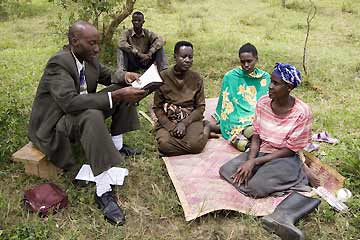California Baptists adopt budget, reject measure related to Baptist Faith & Message
Posted: 11/27/07
California Baptists adopt budget, reject
measure related to Baptist Faith & Message
By Terry Barone
California Southern Baptist
WEST SACRAMENTO, Calif. (ABP)—Messengers to the California Southern Baptist Convention’s annual meeting adopted an $11.6 million budget, turned down a constitutional amendment related to the Baptist Faith & Message and re-elected the body’s president.
“Connecting to Accomplish the Work” was the theme of the 67th annual meeting at Russian Baptist Church in West Sacramento, Calif., where 518 messengers and 270 guests registered.
Messengers approved a 2008 budget of $11,647,222, a decrease of $358,823 from the 2007 budget. The decrease primarily is due to the adjustment of the California Mission Offering goal from $1.34 million to $525,000. There is no change for 2008 of the $8,316,472 Cooperative Program objective.
Several changes were reflected in the 2008 spending plan over 2007, primarily percentages allocated for each of the convention entities—California Southern Baptist Convention, Southern Baptist Convention, California Baptist University and California Baptist Foundation.
The amount going to the SBC for world missions increased from 28 to 29 percent. Executive Board Chairman Milton Steck said the percentage will increase another point in the 2009 budget. The amount budgeted for SBC is $2,411,777.
Under the spending plan, California Baptist University will receive 13 percent, or $1,081,141, a decrease of 3.438 percent. The decrease came after a resolution from university trustees asking the university’s Cooperative Program allocation be reduced to 10 percent over a two-year period.
The California Baptist Foundation will receive 1 percent, or $83,165, of the CP objective.
The remaining 57 percent, or 4,740,388, of Cooperative Program gifts is allocated for Executive Board ministries to churches statewide.
The proposed budget calls for receipts received over the basic objective to be distributed equally between the SBC for world missions and the state convention.
Messengers also turned away a constitutional amendment requiring the Baptist Faith & Message most recently adopted by the Southern Baptist Convention as the one to qualify churches for membership in the state convention.
Sid Peterson, a messenger from Westchester Baptist Church in Bakersfield, Calif., introduced the proposed change in 2006.
The most recent Baptist Faith & Message was adopted by the SBC in 2000. Two other statements of faith were adopted by the SBC—one in 1925, the other in 1963.
Re-elected by acclamation to a second, one-year term as president was Paul Wilkerson, a retired director of missions and current interim pastor of Desert Springs Church in Hesperia, Calif.
Don Conley, pastor of Encanto Baptist Church in San Diego, Calif., was elected as first vice president. Conley was elected over Rick Bennett, pastor of Central Coast Baptist Church in Grover Beach, Calif.
Alton Vines, pastor of New Seasons Church in San Diego, was elected as second vice president. He defeated Jeff McCulty, pastor of The Church on Pearl in Santa Monica, Calif.
Paul Plunk, minister of music at Del Cerro Baptist Church in La Mesa, Calif., was elected music director by acclamation.
Another constitutional amendment to change the state convention’s name to the “Network of California Baptist Churches” was introduced by Tom Stringfellow, messenger from First Baptist Church of Beverly Hills in West Hollywood, Calif. The amendment will be brought to messengers at the 2008 annual meeting.
During miscellaneous business, Ron Wilson, messenger from First Baptist Church in Thousand Oaks, Calif., introduced three motions. Two of the motions dealt with salaries and financial packages for convention entity executives, while the third dealt with including Golden Gate Baptist Theological Seminary in the convention budget. All three of the motions were overwhelmingly defeated.
In other business, Chris Clark, messenger from East Clairemont Southern Baptist Church in San Diego, asked California Southern Baptists to become involved in efforts to amend the California Constitution to define marriage as between one man and one woman.
News of religion, faith, missions, Bible study and Christian ministry among Baptist churches, in Texas, the BGCT, the nation and around the world.




